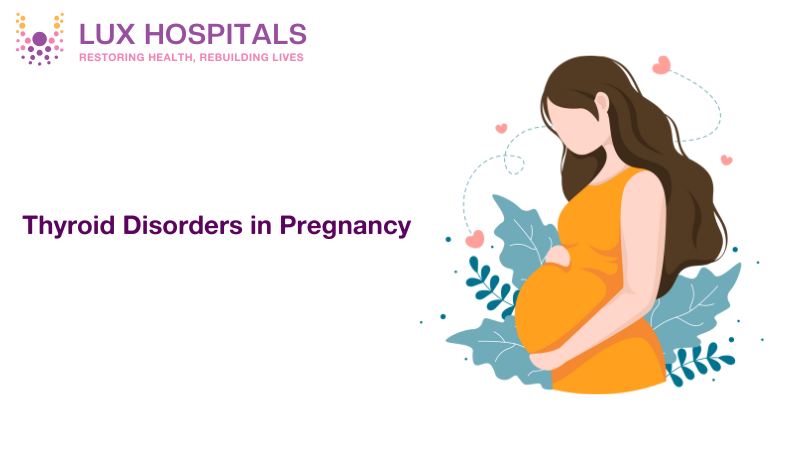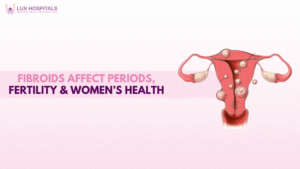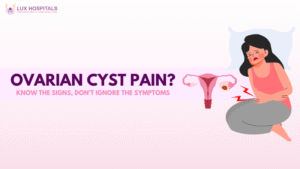The Impact of Thyroid Disorder during Pregnancy and Motherhood

The thyroid gland keeps the body’s metabolism and hormones in balance. A healthy thyroid disorder during pregnancy is paramount to both mother and fetus. Pregnancy in conditions of thyroid disorder during pregnancy may result in complications if left untreated early, thus making an early diagnosis and treatment essential.
In this blog we will learn what the thyroid does in pregnancy, how it influences the body, the types of thyroid disease, causes and reasons, signs and symptoms, precautions, effects on mother and child, and treatments.
What is thyroid disorder during pregnancy?
The thyroid is a tiny, butterfly-like gland in the anterior part of the neck. It secretes hormones such as thyroxine (T4) and triiodothyronine (T3), which control metabolism, production of energy, and overall body function. The thyroid gland also adjusts during pregnancy to promote fetal development. Thyroid hormone levels rise by about 30–50% to facilitate the demands of the developing infant.
The hormones play a crucial role in the development of the infant’s brain and nervous system, especially in the first trimester before the baby’s thyroid gland activation. Pregnancy with a thyroid disorder during pregnancy may result in miscarriage, preterm labor, and congenital abnormalities in the infant. Thus, the thyroid hormone should be checked in the early stages of a normal pregnancy.
Types of Thyroid Diseases During Pregnancy
1. Hypothyroidism
Hypothyroidism refers to the thyroid gland’s inability to secrete adequate thyroid hormones. It may result in slowed metabolism and lead to pregnancy abnormalities. It is primarily due to Hashimoto’s thyroiditis (an autoimmune disorder) and a deficiency of iodine.
2. Hyperthyroidism
Hyperthyroidism is excessive secretion of thyroid hormones, which causes heightened metabolism. The most prevalent cause during pregnancy is Graves’ disease.
3. Postpartum Thyroiditis
Other women develop postpartum thyroiditis, a condition in which thyroid inflammation follows delivery to induce transient hyperthyroidism and then hypothyroidism.
Thyroid Disorders Impact Pregnant Women and the Baby
Effects on Mother:
- Risk of miscarriage
- Preeclampsia (pregnancy-induced hypertension)
- Anemia
- Heart complications
- Premature labor
Risk of postpartum depression
- Effects on the Infant:
- Low birth weight
- Delay in developmental stages
- Neurological abnormalities
- Stillbirth in extreme situations
- Learning disability and mental retardation
Untreated thyroid disorder during pregnancy has grave long-term consequences for the growth and development of the infant. Proper control and regular monitoring go a long way in reducing such threats.
Precautionary Tips for Thyroid Disorder Treatment during Pregnancy
Thyroid disorder during pregnancy requires foresighted actions:
- Periodic Thyroid Function Tests: Checks on TSH, T3, and T4 levels are a guarantee of proper thyroid treatment.
- Adequate Medication: Pregnant women should administer prescribed thyroid medicines such as levothyroxine in hypothyroidism or antithyroid drugs in hyperthyroidism.
- Safe Iodine Consumption: Adequate consumption of iodine from food items (e.g., iodized salt, milk products, sea foods) is essential.
- Healthy Diet: Selenium- and zinc-laden food through a balanced diet facilitates thyroid functions.
- Regular Prenatal Check-ups: Consultation with a health care provider is necessary for early detection and treatment.
- Avoid self-medication: Over-the-counter use of thyroid medication by oneself without medical consultation is harmful.
- Stay Hydrated: Adequate consumption of water assists metabolic processes and general well-being.
- Manage Stress: Stress affects the thyroid, and meditation, deep breathing, and yoga exercises are beneficial.
Treatments for Thyroid Disorders in Pregnancy
1. Medication
- Hypothyroidism: Levothyroxine is the drug of choice, ensuring normal thyroid activity.
- Hyperthyroidism: Propylthiouracil (PTU) in the first trimester and methimazole later.
2. Lifestyle and Dietary Adjustments
- Consuming foods that are rich in iodine, such as eggs, milk, and seafood
- Not consuming goitrogenic foods (e.g., raw cabbage, soy) excessively
- Relief from stress by yoga and meditation
- Prenatal vitamins used as prescribed by a doctor
- Prevention of too much caffeine use, which would interfere with thyroid hormone absorption
3. Surgery
Thyroidectomy (removal of the thyroid gland) is done in unusual circumstances if medication doesn’t work or if a thyroid tumor exists.
Conclusion
Abnormalities of the thyroid disorder during pregnancy have to be diagnosed at the right time and treated similarly to ensure mother and infant health. Regular monitoring, control, and lifestyle changes are important in preventing complications. Pregnant women with thyroid abnormality must be closely monitored by their medical team to ensure that they are able to regulate hormones and have a healthy pregnancy.
Routine screening should be done in women presenting symptoms or a history of thyroid illness to prevent complications. By knowing about thyroid disorder during pregnancy, women may take positive measures towards a healthy pregnancy and a healthy baby. Always seek the advice of a health provider for individual medical information.
Can thyroid abnormalities be detected before pregnancy?
Yes, thyroid function tests can identify any underlying condition prior to conception.
Can I have a healthy pregnancy with a thyroid disorder?
Yes, as long as they are treated and monitored properly, women with thyroid disorders pregnancy can enjoy a healthy pregnancy.
Do thyroid medications affect the baby?
No, thyroid medications under a physician’s care keep hormone levels normal, enabling proper development of the baby.
Can thyroid disorders happen during pregnancy?
Yes, some women develop thyroid issues due to hormonal changes during pregnancy, even if they never had an issue.
Should thyroid screening be undertaken in all pregnant women?
Routine screening should be done in women presenting symptoms or a history of thyroid illness to prevent complications.



















